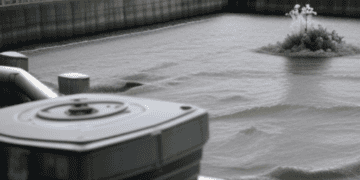Japan has reported an incident involving a brick thrown at its embassy in Beijing, along with other forms of harassment directed at Japanese citizens in China. This uptick in hostility follows Japan’s decision to release wastewater from the Fukushima nuclear plant into the Pacific Ocean, a move that has attracted significant international criticism.
China, a staunch critic of Japan’s wastewater discharge plan, has banned all imports of Japanese seafood in response. The ban comes despite reassurances from Japan and the UN’s nuclear watchdog that the discharge process adheres to international safety standards. In addition to China’s ban, heightened inspections of Japanese aquatic products have been implemented by other countries, and protests have occurred in South Korea and Japan.
Japanese Foreign Minister Yoshimasa Hayashi expressed concern over the situation, stating the need for Beijing to take measures to de-escalate tensions and ensure the safety of Japanese residents and diplomatic missions in China. Hayashi’s comments followed media reports about the brick-throwing incident at the Japanese embassy and numerous prank calls received by embassy staff from Chinese numbers.
China’s foreign ministry spokesperson, Wang Wenbin, claimed a lack of awareness about these specific harassment allegations but emphasized China’s commitment to protecting foreign nationals’ safety and lawful rights in the country. However, Wang also reiterated China’s stance on Japan’s responsibility for the wastewater disposal.
The wastewater in question, used to cool the damaged Fukushima reactors, has been treated to remove radioactive elements, except for tritium. Tritium, a hydrogen isotope difficult to eliminate, has been reduced to safe levels. Tritium release is a common practice in regular nuclear power station operations, including those in China.
Amid the discharge, which began on August 24, Japan has advised its citizens in China to maintain a low profile and has bolstered security around schools and diplomatic sites. Reports indicate that various Japanese businesses, government offices, and schools, including in Fukushima, have received numerous abusive calls from Chinese phone numbers since the discharge commenced.
Japanese Vice Foreign Minister Masataka Okano summoned the Chinese ambassador to Japan, Wu Jianghao, to request calm and responsible behavior from Chinese citizens. In a countermove, the Chinese Embassy in Tokyo stated that it received a significant number of nuisance calls from Japan, causing disruption to its operations. Ambassador Wu expressed stern representations regarding the issue.
The process of releasing Fukushima’s wastewater is projected to last between 30 to 40 years. To address concerns of safety, Japan has committed to transparently disclosing all related data, with recent seawater and fish sampling showing results well within safety limits. Economy and Industry Minister Yasutoshi Nishimura visited Fukushima to support local products and reaffirm the safety of the discharge process.
Discover supply chain news insights on The Supply Chain Report. Enhance your international trade knowledge at ADAMftd.com with free tools.
#JapanEmbassy #BeijingIncident #FukushimaWastewater #ChinaJapanTensions #JapanSeafoodBan #WastewaterRelease #FukushimaDischarge #TritiumRelease #JapanChinaRelations #DiplomaticTensions #UNNuclearStandards #FukushimaCrisis #JapaneseCitizensSafety #JapanForeignMinistry #ChineseEmbassy #InternationalCriticism #NuclearSafety #FukushimaReactor #JapaneseDiplomaticMission #ChinaJapanDiplomaticTensions #WastewaterConcerns #OceanDischarge #JapanChinaRelationsUpdate















